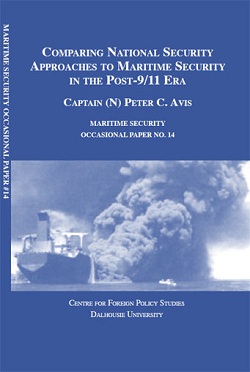Comparing National Security Approaches to Maritime Security in the Post‑9/11 Era
Maritime Security Occasional Paper No. 14
Captain (N) Peter C. Avis
Fall 2005
ISBN 978-1-896440-47-9
$10.00 CDN (plus S&H)
It has become clear that terrorists have changed the global battle space. What is less clear is how security policy has changed to reflect this. While aware of the possibility of using prevention to cope with the change in the security environment, existing security policy in Canada tends to focus on crisis management and consequence management.
What are other countries doing to meet the challenge of maritime security in the post-9/11 era? It seems important to find out. To discover how other countries are responding to the changed maritime threat environment, this monograph examines three countries that are similar to Canada - Australia, Norway and the Netherlands.
The monograph examines four key maritime activities: collaboration, domain awareness, safeguarding and responsiveness. These activities are then prioritized for each case-country in order to show how these countries utilize their national assets to meet the challenge of ensuring maritime security in an age of terrorism. A list of best practices is then compiled based on a comparison of the case-countries.
It is clear that countries that perceive a direct threat to their homeland, particularly that of strategic terrorism, are likely to weigh their priorities in favour of cooperative and proactive approaches to national and maritime security. By enacting preventive approaches, the countries seek to prevent major attacks on their soil and to neutralize threats before they take shape far beyond their borders. Having made a list of best practices, this monograph then discusses the applicability of these practices to Canada and the possibilities for policy improvement in Canada.
Please contact the centre to purchase a copy.
